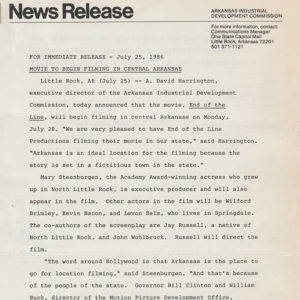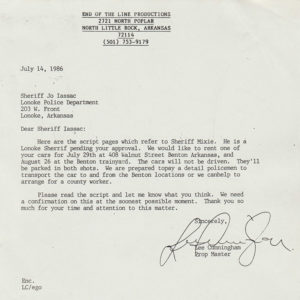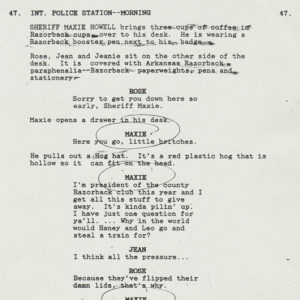calsfoundation@cals.org
End of the Line
End of the Line is a film set in the fictional town of Clifford, Arkansas, that deals with working-class issues of the loss of job security, worker entitlement, and the powerlessness of average people when up against faceless corporations. The film stars Wilford Brimley and Arkansas native Levon Helm and features in supporting roles Holly Hunter, Kevin Bacon, Clint Howard, and Arkansas native Mary Steenburgen (who was also the executive producer). End of the Line was the first film directed by Arkansas native Jay Russell, who went on to direct many well-known films, including Tuck Everlasting, Ladder 49, and My Dog Skip. Russell also co-wrote the script with John Wohlbruck. Much of the movie was filmed in or near Little Rock (Pulaski County).
The film centers upon Will Haney (Wilford Brimley), a not-quite-retirement-age railroad brakeman, who, along with Leo Pickett (Levon Helm), arrives at work one day to find that the Southern Railroad line has been closed. Southland, the company that owns it, has decided to use air freight instead of railroads. Haney has had enough. His daughter is involved with Everett (Kevin Bacon), a coworker whom Haney dislikes for his youth and lack of respect. Too old to find work elsewhere, and unwilling to try, Haney feels entitled to better treatment from a company for which he worked most of his life. He tries to stir the other workers up and plans a march to protest the closing, only to discover that Pickett is the only other worker who shows. In desperation, Haney convinces Pickett to steal an engine and make the journey to the company headquarters in Chicago to speak directly to Southland president Warren Gerber (Bob Balaban), a former brakeman himself. The plan is to stir up publicity for their cause. Along the way, the two receive help from sympathetic working-class citizens.
At the August 28, 1987, world premiere of End of the Line in Little Rock, Steenburgen and Russell, whose fathers were both railroad workers, dedicated the film to all those who worked on railroads. Despite local excitement, however, the movie received mixed reviews upon wide release, with Rita Kempley of the Washington Post dubbing it a “two-hour guilt trip” and Roger Ebert decrying the characters as almost impossible to believe in. Nationally, it had a lackluster performance at the box office.
For additional information:
Bradburn, Cary. “Premier of Arkansas-Made Movie Offers Night of Glitter, Excitement.” Arkansas Gazette. August 27, 1987, p. 8A.
“End of the Line.” Internet Movie Database. http://www.imdb.com/title/tt0092967 (accessed September 21, 2022).
C. L. Bledsoe
Ghoti magazine
 Arts, Culture, and Entertainment
Arts, Culture, and Entertainment End of the Line Press Release
End of the Line Press Release  End of the Line Production Letter
End of the Line Production Letter  End of the Line Script Page
End of the Line Script Page 




Comments
No comments on this entry yet.